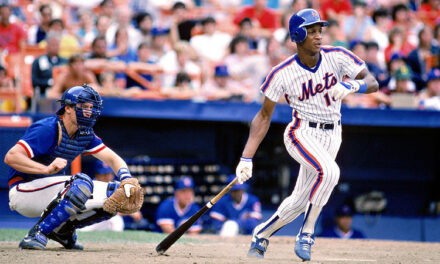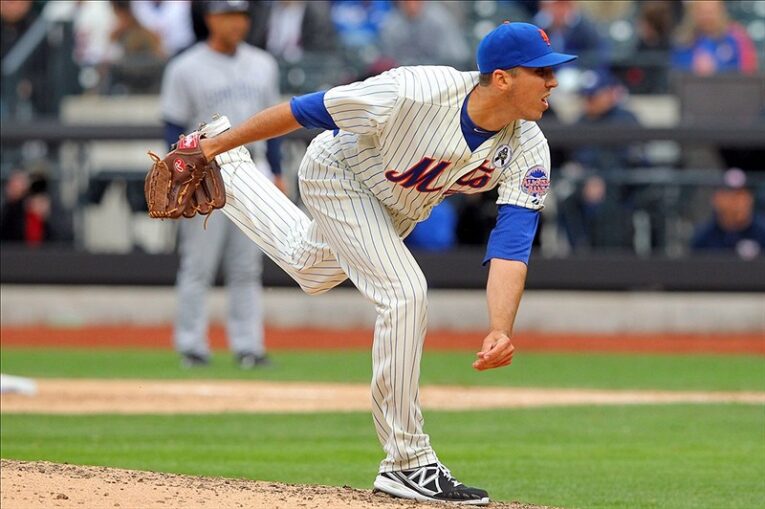
Some prospects shoot right through the minors and make their major league debut in their early 20s or sometimes even in their teens, while most others have to bounce around various levels and organizations to grind their way to the top. After all, making it to the major leagues is one of the hardest tasks for any athlete, and it’s something that almost all kids dream about when they’re young.
In the case of southpaw Scott Rice, it was the latter, as Scott did not have an easy time at all making it to the majors. His story is one of countless bumps in the road, as well as a fair share of moments of achievement and glory that made all the time and hard work worth it.
Rice was born and raised in Simi Valley, California, where he pitched on the Royal High School baseball team. His professional baseball career took off in a bright direction, as he was drafted by the Baltimore Orioles in the first round of the 1999 draft. However, he struggled early on in his professional career as a starting pitcher, and by 2005 he transitioned to a full-time relief pitcher as he had still yet to make it past Double-A.
He finally made it to Triple-A in 2006, but never got a call-up and granted free agency after the season. He then signed a minor league deal with the Rangers, but only made eight appearances in 2007 before he got injured and went down.
After missing an extended amount of time and getting surgery on his flexor tendon in 2008, he returned to pitching with the independent Long Island Ducks and Newark Bears, where he struggled early on as he tried to get back into the rhythm of pitching.
From 2008 to 2010, he caught on briefly with the Dodgers, Padres, and Rockies, pitching in their minor league systems to varying degrees of success. However, it never amounted to anything. He signed with the Cubs after the 2010 season, but was released before the 2011 started.
With that, he went back to independent ball, pitching to a 2.45 ERA in 15 games for the York Revolution before being signed by the Dodgers for a second time. He ended up posting a 1.95 ERA in 50.2 innings for Double-A Chattanooga, and pitched 54 games for Triple-A Albuquerque in 2012 before granting free agency yet again at the end of the season.
To Rice’s luck, though, he was signed by the Mets in 2013 and invited to Spring Training, where he posted a 2.92 ERA in 11 games. And sure enough, at age 31, he made the big league team out of Spring Training, as he finally got to taste the major leagues after 14 years in the minors.
And not only did Rice make the major league team, but he stayed there. He ended up pitching a staggering 73 games for the Mets that year, posting a very solid 3.71 ERA. He also pitched 32 games for the Mets in 2014, re-signed with them in the offseason, and posted a 1.82 ERA in 56 games for Triple-A Las Vegas in 2015. One of my earliest memories of Scott was actually going to Las Vegas that year and watching him pitch for the 51s. I included a fun little anecdote about Scott (along with other fun minor league stories) in this article that I wrote back in December.
However, he did not receive another call-up to the Mets, and briefly joined the Diamondbacks organization and went back to the York Revolution before retiring from baseball in 2016.
Today, Scott still lives in his home city of Los Angeles, where he works as a real estate agent. I recently had the privilege of being able to talk with him about his career and how he is enjoying his life after baseball.
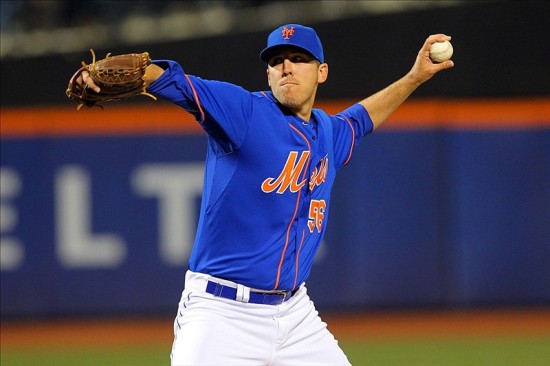
MMO: When you were a kid, who or what gave you the inspiration to want to someday become a professional baseball player?
Rice: That would be my dad. My dad played baseball growing up, he loved it. He played for USC, and blew out his shoulder, and back then they weren’t able to have, you know, they didn’t have arthroscopic surgery like they do today, so he stopped playing then. But it was always something I had growing up, playing baseball and the big thing that we had, all important memories.
MMO: You were drafted in the first round by the Orioles in 1999. What was that feeling like and did you feel any extra pressure or expectations being drafted in the first round?
Rice: It was really surreal. It was one of those things where I always knew I was a good baseball player, but I never really knew how good. When I was playing village and I was playing national tournaments and stuff, the competition I was playing against was fairly regional. So being drafted in the first round really opened my eyes up to the potential that other people saw in me. So it was really validating for me to see that other people valued the skills that I had.
As far as feeling pressure, a little bit I think, you know, because with responsibility and with being thrust upon as far as being a first round draft pick there is always going to be a little bit of pressure, but none of the pressure externally could ever match the pressure I put on myself and expectations I have for myself. So mostly it was internal pressure I’d say I put on myself to be the best I could be.
MMO: You started some games earlier in your professional career before eventually transitioning to a full-time reliever. How hard was it to transition to that new role?
Rice: It wasn’t that difficult, I actually enjoyed it. As a starter, I mean I know there’s a lot of — you know, as a starter you get paid more money, you get to start the game, you do all these things. But for me it was, going through the first couple innings of the game, and you kind of get in the tone. But the end of the game is where there’s the excitement, the end of the game is where you really win or lose the game coming into the seventh, eighth, ninth inning.
And also, I like the feeling of being able to come to the stadium every day and help the team win, and have the opportunity to help the team win. So as a starter, you play once every five days, and then you kinda come to the stadium and you’re a spectator. So I really enjoyed being a reliever. As you know, when I was with the Mets, I wanted to pitch every day, I wanted to help the team every single day with whatever they needed from me. So I really enjoyed it, and it wasn’t like a huge transition for me because eventually that’s what I wanted to be.
MMO: You played in the minors and independent leagues for 14 years before getting a call-up. How did you keep yourself motivated to keep going through the daily grind of minor league baseball for all those years, especially while dealing with injuries too?
Rice: Yeah, you know, really I didn’t have a lot of injuries; I had one, and it was a major injury coming up before I got to the Mets. It was just one injury, it was only one time I was ever on the DL, and because it was an injury that was misdiagnosed. So I ended up missing about two and a half years of my career, one and a half years trying to find out what that injury was until I finally figured it out, and then the second year of rehabbing it until I finally got healthy.
So, you know, I knew the ability was there, I knew that I just needed the opportunity. I was coming off a really good year before I got hurt, and the way I looked at it was, “I just got two and a half years off so I’m fresh.” All these other guys going out there, they had been throwing every day, but I have a fresh new arm, and I have a lot more experience because I was watching the game a lot more, and I started studying and watching pitchers, learning and really reinventing myself on the mound. So I didn’t take any time off while I was hurt. So yeah, it was knowing inside myself that I had the ability, and as long as teams kept giving me uniforms and kept putting the jersey on me, I was gonna go out there until eventually someone saw the value that I saw in myself.
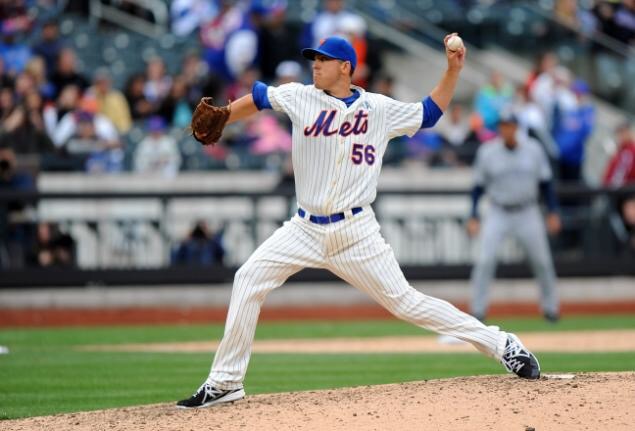
MMO: What message do you have for all those hundreds of longtime minor leaguers hoping to someday get that call into their manager’s office to tell them they were being called up to the big leagues?
Rice: Yeah well, when I was a kid, I was pitching in a game as a little kid, and I wasn’t doing well. And I was out there on the mound and I gave up. I quit. I did exactly everything that you should never do. And it was embarrassing, now looking back at it. It was embarrassing for my parents who were watching the game, and everyone else. I was maybe ten years old, 12 years old or something, and so I didn’t know any better.
And my parents gave me this little trinket thing that said, “Never, never quit.” And it’s from then on that it kind of became a motto of mine, to not give up, to never quit. And I think that’s something that I would give to any kid, it’s like, as long as you have a uniform, you have a chance. You know, I was drafted in the first round, and I was a prospect and I was given every opportunity. And then I got hurt and I had to reinvent myself, and I went from being a first round draft pick and a prospect to being a guy that was the last guy on the team. I went to Spring Training one year and I had to beat out 22 other left-handed pitchers, so I went from the top to the bottom and had to reinvent myself back up.
So it doesn’t matter where you start, as long as you just keep taking it slow, and getting better every single day and not worrying about the people around you, and just worrying about what you can do and how you can take care of yourself, eventually you can reach the top. And it’s not about timing, it’s not about people who get there — you know, some guys like Conforto, shoot right through the minor leagues, goes right to the big leagues and stays there forever. You know, he’s gonna stay there forever. There’s other guys who had to work a little bit longer. Or other guys like deGrom who started off as a shortstop and then had to get converted into a pitcher before he wins the Cy Young. So there’s a lot of different avenues, and as long as you have a uniform on your back, you have a chance.
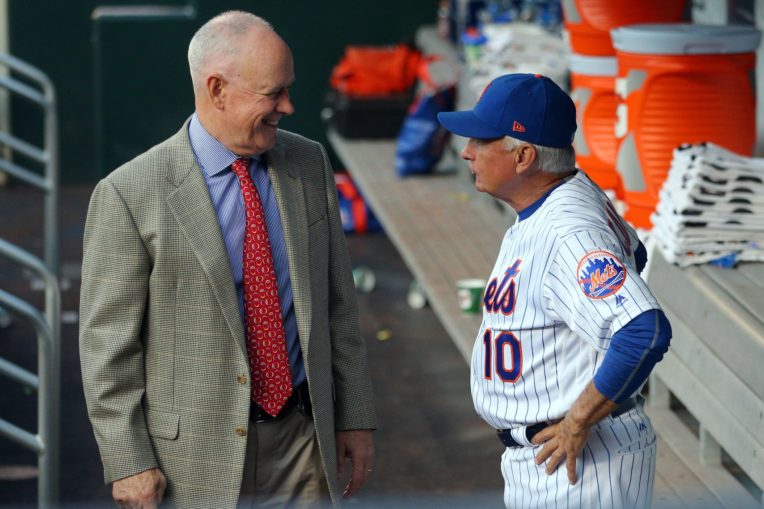
MMO: Who gave you the news that you had made the big league team in 2013, and what was that feeling like?
Rice: The news, it was — well, I went into the office and Terry Collins and Sandy Alderson were there. I was sitting in my locker and Dan Warthen came and tapped me on the shoulder. Normally that tap on the shoulder was always, “Hey, it’s cut day, the manager wants to see you, tell you you’ve been sent down, so you’ll be going to Triple-A.” But Dan kind of tapped me on the shoulder and kind of winked at me, so, you know, I wasn’t believing anything, but I kinda — I went in there with a little bit more hope than I had in the past. You know, I had a great spring, but you know, other years I’ve had great springs just like I had that year.
So yeah, it was incredible. I don’t know if — I don’t even remember a word they said, because as soon as he said “You made the team,” it was a whirlwind.
MMO: You posted a 3.71 ERA in 73 appearances that year. What would you attribute your sustained success to?
Rice: My sustained success in that year was because of my preparation. I was going out there every single day, and I was preparing myself, consistently working every day. I had a routine that I would do before the game, and I would stick to it every single game. I would take care of my body, I would study the hitters and, you know, there’s a lot of help I had from Dan Warthen, Ricky Bones in the bullpen, LaTroy Hawkins, a lot of the guys on the team. It was a really good team in the bullpen that year of guys, everyone rooting for each other. It was a good mix of veterans with John Buck catching, and so it was a better team than our record showed.
MMO: Appearing in 73 games, surely some of those appearances were incredibly memorable for you. Are there any moments from that 2013 season that truly resonated with you?
Rice: Yeah, I think every moment, honestly. It took me so long to get there that I really relished every single moment, every single opportunity that I had, which is why I never turned the ball down. You know, when Terry said “Hey, are you okay?”, even though there were days I probably should have said “Hey, I need a day off,” I wasn’t ever gonna say no because I was gonna soak up every single opportunity I had, and I was gonna make the most of it.
So, you know, obviously going out there on Opening Day, getting my first inning under my belt, was a huge memorable experience for me. Going back and pitching at Dodger Stadium, you know, growing up a Dodger fan, going to games every year. Being able to be on the other side of the field was pretty memorable as well. Pitching in the Subway Series, I just remember watching the Mets-Yankees World Series, I remember watching the Subway Series as a teen, just the excitement in New York. And you know, doing that, pitching in the Subway Series was pretty awesome. So those would probably be the three biggest memories I have.
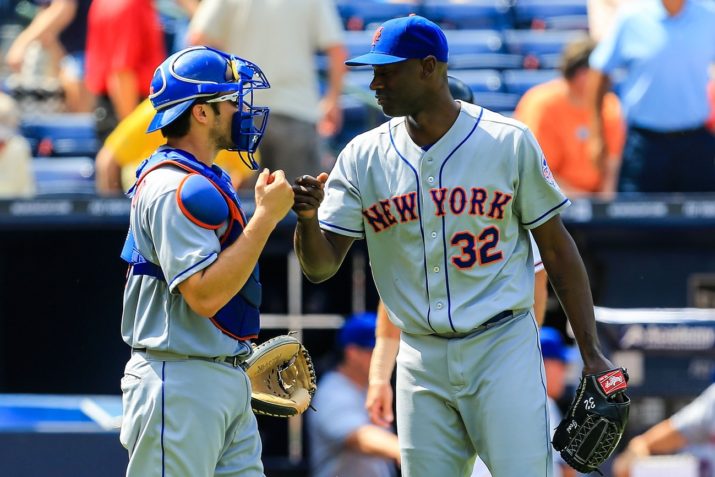
MMO: Were there any guys in the Mets clubhouse who really helped you from a leadership standpoint or who you became really close with?
Rice: Yeah, there was. Definitely LaTroy Hawkins. Coming up as a rookie, you know, being a 31-year-old rookie, it was a little bit different than being like a 22-year-old rookie, so LaTroy took me under his wing, but also showed me some of the respects, which was really nice. So I had that. John Buck was really good, and Anthony Recker, were both very smart catchers that we worked with all the time. But yeah, I’d say LaTroy for sure was kind of the biggest influence on me while I was there.
MMO: When did you think that it was time to retire from baseball and hang up the cleats?
Rice: It got to the point where my wife had a baby, and so I was a father now. And I knew that I was at that point in my career where sticking on the major league team and being there for the whole season was not going to be necessarily guaranteed. And bouncing around, and you know I went from the Mets, then I went to the Diamondbacks, and then I played a little bit of independent ball. Then I just decided, you know, I can keep trying to give this a try, but it’s not fair to my family. You know, I had a really good run, and I played much longer than I ever could have dreamed of. But I wanted to switch focus and focus on being a dad, and being home with my kids.
MMO: What drew you to want to work in real estate after your baseball career was over?
Rice: While I was growing up, my dad was a general contractor, so he built custom homes. And what we’d do was in the summer time, we’d go — I’d go out to work with him, and he’d go from one job site to the other job site while he was checking off the different homes he was building. And in between, we’d always find a batting cage or a baseball field or somewhere out we could go and play baseball. So my two dreams as a kid growing up was number one, I was in — I forget, maybe second grade — and the teacher asked everyone what they wanted to be when they grew up. And you know, I raised my hand and said I wanted to be a Major League Baseball player, and all the kids laughed. So from then on, I said well — I changed my answer. And I said, “Well I want to work in construction and real estate like my dad.”
And so that was always my backup plan if I didn’t make it to the major leagues, which I didn’t know if I was able, to get drafted and play baseball. So my dream was to play baseball but in reality I thought I’d still be at home, selling homes and things like that. So it was just a natural fit to get into real estate.
MMO: Is real estate something you plan to keep doing for a long time?
Rice: Yeah, it is. It’s something I’ve talked with some ex-players, and some guys who are actually still playing now. We’ve developed some groups that were put together, and we’re gonna do some slips and we’re gonna build some homes, and so I have a lot of connections with the baseball community. So I get to stay in touch that way where I can help them invest a lot of their money besides just in stocks and their financial advisers, but we can make real estate investments as well.
And I think that’s one of the things as a baseball player that you always have everyone coming at you trying to tell you that “Hey, I can help you out this way or that way,” you never know who to trust, but you’ve gone to battle — well no, not battle, I don’t want to use that word — but you’ve gone on the field and you’ve competed with guys on the baseball field, you’ve learned to trust and you’ve learned to know them, so it’s a natural fit for a lot of the guys to trust me knowing that I have the best interest in mind. So that’s part of what I do in real estate is bringing and helping out a lot of those athletes onto success in real estate property.
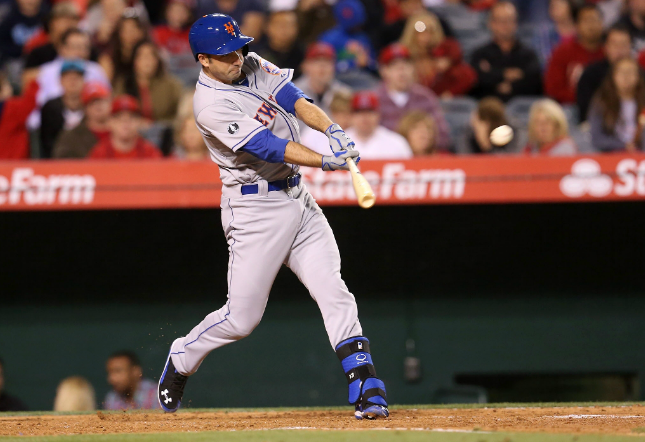
MMO: Are there any similarities between real estate and baseball? In other words, do you think having played professional baseball gives you any advantages or extra skills in the real estate world?
Rice: Yeah, it opens the door, it definitely opens the doors. When I’m talking to people and I tell them I’m a former Major League Baseball player, it definitely opens eyes. And for me, I think that it helps because of my competitiveness. Taking that competitiveness from baseball and just refocusing it to real estate definitely helps. I think that there’s a grind that you have playing professional sports; it teaches you a different type of grind than what you get just in the workforce.
And so, using that, I remember Josh Satin told me that once he retired, I was kicking around the tires and wanted to retire, and Josh goes, “I’ll tell you what. A lot of these people” — because he was retired at the time — “A lot of these people, they don’t understand the grind that we had to go through in baseball. The long days, the travel, and all that stuff.” He goes, “You’re gonna do just fine because of what you’ve gone through and what we’ve had to go through as far as climbing to the top of the elite levels of professional sports.” That gave me a lot of confidence in transitioning outside of baseball.
MMO: I saw earlier this season that you attended a baseball game as a fan for the first time in over 20 years. Was it weird or different viewing the game from a different perspective than you were used to?
Rice: Yes, yes it was. I wasn’t sure how it was gonna be, just because I’d never really watched a game before as a fan, so yeah it was cool, it was weird. I went down on the field, I went and said hi to Familia and deGrom and Wheeler and Syndergaard, all my buddies and stuff. But it was kind of strange because you’re looking at them, and the security guards are looking at me, you know normally I was always on the field and you didn’t really have an issue getting onto the field, so having to get permission to get on the field was a little bit strange.
And so yeah, it was a little bit weird but it was kind of funny as I bumped into guys. As I was there on the field, David Wright was also out there, and Mike Nickeas, ex-catcher for the Mets, who, you know, I played with David and I grew up with Nickeas. So seeing them in the same position I was in kind of made it all come full circle, and it made me realize the positives and how lucky I was to go play Major League Baseball and be able to be a part of it.
MMO: Lastly, is there anything you miss about playing the game?
Rice: Yeah, I guess all of it. You know, I miss everything about baseball. It was really difficult to go from playing baseball to not playing baseball anymore. And I think that for everybody, even kids from — I’m sure for you it was a tough decision when you decided to stop playing baseball — for high school kids, for college kids, whenever the last day comes, you know you’re never gonna put that uniform on again, that’s always difficult.
But for me it was such a part of my life, you know it was 18 years professionally, it was the first 36 years of my life — I was a baseball player. And that’s part of what I defined myself as, so going out there and having to take away such a big part of my life was pretty difficult.
MMO: Thanks for taking the time to speak to me today, and good luck with everything.
Rice: Thanks man! Yeah, send over the article.





